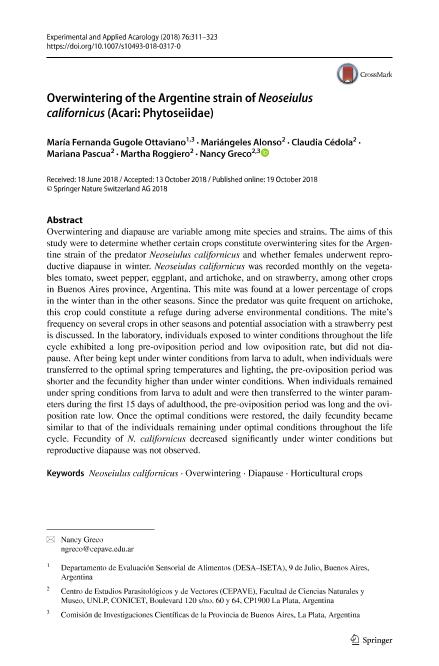Artículo
Overwintering of the Argentine strain of Neoseiulus californicus (Acari: Phytoseiidae)
Gugole Ottaviano, Maria Fernanda ; Alonso, Mariángeles
; Alonso, Mariángeles ; Cédola, Claudia Viviana; Pascua, Mariana Soledad
; Cédola, Claudia Viviana; Pascua, Mariana Soledad ; Roggiero, Martha Florencia
; Roggiero, Martha Florencia ; Greco, Nancy Mabel
; Greco, Nancy Mabel
 ; Alonso, Mariángeles
; Alonso, Mariángeles ; Cédola, Claudia Viviana; Pascua, Mariana Soledad
; Cédola, Claudia Viviana; Pascua, Mariana Soledad ; Roggiero, Martha Florencia
; Roggiero, Martha Florencia ; Greco, Nancy Mabel
; Greco, Nancy Mabel
Fecha de publicación:
10/2018
Editorial:
Springer
Revista:
Experimental and Applied Acarology
ISSN:
0168-8162
Idioma:
Inglés
Tipo de recurso:
Artículo publicado
Clasificación temática:
Resumen
Overwintering and diapause are variable among mite species and strains. The aims of this study were to determine whether certain crops constitute overwintering sites for the Argentine strain of the predator Neoseiulus californicus and whether females underwent reproductive diapause in winter. Neoseiulus californicus was recorded monthly on the vegetables tomato, sweet pepper, eggplant, and artichoke, and on strawberry, among other crops in Buenos Aires province, Argentina. This mite was found at a lower percentage of crops in the winter than in the other seasons. Since the predator was quite frequent on artichoke, this crop could constitute a refuge during adverse environmental conditions. The mite’s frequency on several crops in other seasons and potential association with a strawberry pest is discussed. In the laboratory, individuals exposed to winter conditions throughout the life cycle exhibited a long pre-oviposition period and low oviposition rate, but did not diapause. After being kept under winter conditions from larva to adult, when individuals were transferred to the optimal spring temperatures and lighting, the pre-oviposition period was shorter and the fecundity higher than under winter conditions. When individuals remained under spring conditions from larva to adult and were then transferred to the winter parameters during the first 15 days of adulthood, the pre-oviposition period was long and the oviposition rate low. Once the optimal conditions were restored, the daily fecundity became similar to that of the individuals remaining under optimal conditions throughout the life cycle. Fecundity of N. californicus decreased significantly under winter conditions but reproductive diapause was not observed.
Palabras clave:
Diapause
,
Horticultural Crops
,
Neoseiulus Californicus
,
Overwintering
Archivos asociados
Licencia
Identificadores
Colecciones
Articulos(CEPAVE)
Articulos de CENTRO DE EST.PARASITOL.Y DE VECTORES (I)
Articulos de CENTRO DE EST.PARASITOL.Y DE VECTORES (I)
Citación
Gugole Ottaviano, Maria Fernanda; Alonso, Mariángeles; Cédola, Claudia Viviana; Pascua, Mariana Soledad; Roggiero, Martha Florencia; et al.; Overwintering of the Argentine strain of Neoseiulus californicus (Acari: Phytoseiidae); Springer; Experimental and Applied Acarology; 76; 3; 10-2018; 311-323
Compartir
Altmétricas



